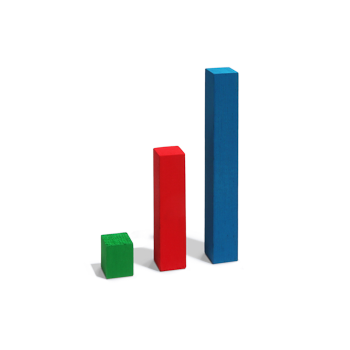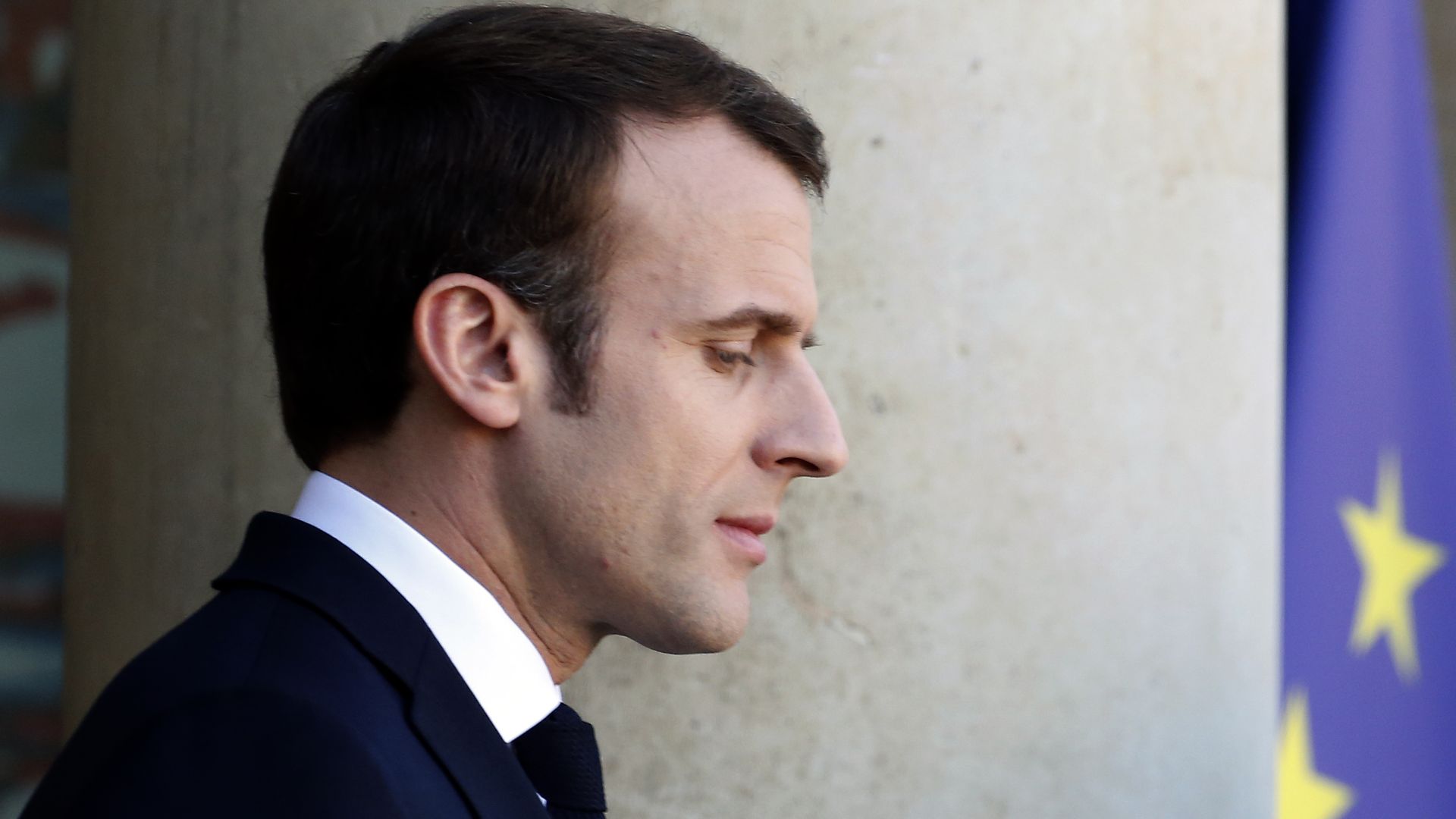Axios Markets

March 05, 2019
Was this email forwarded to you? Sign up here.
Situational awareness:
- Democratic Rep. Peter DeFazio and Alexandria Ocasio-Cortez proposed companion legislation introduced by Hawaii Sen. Brian Schatz to tax securities transactions. (CNBC)
- President Trump plans to end preferential trade treatment for India and Turkey that allows duty-free entry for billions of dollars worth of exports to the U.S. (Bloomberg)
- China will target economic growth of 6.0% to 6.5% in 2019, Premier Li Keqiang said at Tuesday’s opening of the annual meeting of China’s parliament, less than the 6.6% growth reported last year. (Reuters)
1 big thing: The danger in Europe
French President Emmanuel Macron. Chesnot/Getty Images
The European experiment is in trouble and the largely ignored European Parliament elections in May could pave the way for the end of the euro.
Driving the news: French President Emmanuel Macron on Monday placed an op-ed in newspapers around the continent — in all 28 eurozone countries — warning of the "trap" that could destroy the EU.
- "Never since the second world war has Europe been so essential. Yet never has Europe been in such danger," Macron writes.
Details: The every-five-years elections select lawmakers for the body, which shares power over the EU budget and legislation, and makes sure other EU institutions are working democratically.
It's a largely ceremonial body whose elections draw diminishing voter turnout (sinking to around 45% in 2014), but the elections have already shown their importance, Markus Schomer, chief economist at PineBridge Investments, tells Axios.
- "Brexit showed us that they can be very, very consequential and we overlooked it then, didn't we?"
Flashback: In the 2014 European elections the right-wing U.K. Independence Party triumphed over the reigning right-of-center Conservatives, leading the Conservatives to promise a referendum on leaving the EU if they were re-elected.
The next domino in the euro's fall could be France, Schomer says.
- "We're living in a world where there are a lot of angry people everywhere. My worry is something could happen in these elections again that lights the fuse for another Brexit-like event a few years from now."
- A triumph by France's far right and "I think they'll blow up the euro," Schomer says, "and of course blowing up the euro will be a 2008-style financial crisis."
The big picture: This is all happening as the eurozone barrels towards economic growth crisis.
The IMF revised down its forecast for growth to 1.6% in January, but Mohamed El-Erian, chief economic adviser for Allianz SE, said on Monday that such an estimate is actually too optimistic.
He expects the eurozone will struggle to deliver even 1% GDP growth this year and calls the slowdown the biggest risk to the market.
- Worse still, El-Erian tells Reuters the European Central Bank has limited tools at its disposal to respond to economic weakness and European governments are not prepared to respond with spending.
Macron's op-ed seems to confirm the gravity of the situation:
"Citizens of Europe, if I am taking the liberty of addressing you directly, it is not only in the name of the history and values that unite us, but because time is of the essence."
2. Iran is bubbling
Markets also look to be underpricing the risk of the deteriorating situation in Iran.
Why it matters: The country's economy is quickly falling apart, as its oil exports sink and its currency collapses, both largely in response to U.S. sanctions.
- Asia's oil imports from Iran declined in 2018, with China, India, Japan and South Korea reducing intake by 21% to the lowest level since 2015.
Details: The reduced level of crude imports in Asia have come despite the countries continuing to do business with Iran since the U.S. reimposed sanctions in November (they all received sanction waivers). Import levels will likely fall farther when the waivers expire in May.
- Even before the U.S. withdrew from the Iran nuclear deal, the country had been experiencing sporadic unrest and it has only worsened with the currency crisis and oil slowdown.
What's happening: In an effort to offset the economy's weakness Iranian President Hassan Rouhani has pushed forward a budget that will run a deficit amounting to about 10% of GDP or 60% of the state's general budget, according to Bourse & Bazaar, a news website that tracks Iran's economy.
The combination of the deficit spending and extremely weak currency puts Iran at severe risk for a debt crisis.
The bottom line: While it's not an immediate risk, Iran's destabilization could lead to another crisis in and around Europe, this time emanating from a country with a population of 81 million, about 4.5 times the size of Syria.
3. "Next year fuel is going to cost more money"
The oil landscape is changing rapidly. Two major producers, Iran and Venezuela, have had oil output largely sidelined by U.S. sanctions and in Venezuela's case a massive production shortfall.
- Another major change will be in maritime shipping.
What's happening: Next year, the UN's International Maritime Organization will bar ships from carrying fuel that contains sulfur content higher than 0.5% and capping sulfur emissions from ships at 0.5%.
The rule passed despite objections from the U.S. and is part of a plan to cut greenhouse gas emissions in the international shipping sector 50% below 2008 levels by 2050.
Why it matters: Maritime shipping uses about 4–5 million barrels of fuel a day of the oil market's 100-million-barrel-per-day total. S&P Global Platts Analytics estimates that compliance will add $60 billion to fuel costs in 2020.
As the New York Times noted in October, "shippers have been slow either to make the switch to higher-quality fuels or install expensive equipment known as scrubbers to clean exhaust from what is known in the industry as 'bunker fuel.'"
Few oil companies have upgraded their refineries to adapt to new regulations.
- "I don't know if people are ready," Sebastian Esposito, vice president of business development at Inatech, tells Axios. He calls the new IMO regulations "a major disruption" to the oil market.
Inatech, a subsidiary of Glencore, today announced a partnership with Danish shipping company Torm, a leading tanker carrier of gasoline, jet fuel and diesel oil, on its new Smart Trader app. The app allows companies to map their shipping fleets and routes given sea and port conditions.
The bottom line: Esposito says a lot of elements are still up in the air, but "I would imagine next year fuel is going to cost more money."
4. The GDP pothole


The Atlanta Fed's GDPNow model is known for predicting GDP readings that start out exceedingly high and eventually recoil back to trend.
- But Monday's reading shows expectations for just 0.3% growth in the first quarter of 2019. It followed a weak U.S. construction spending report that badly missed expectations.
Why it matters: Since the Tax Cut and Jobs Act was signed into law on Dec. 22, 2017, the metric has largely trended upward, but has fallen significantly since the beginning of the third quarter in 2018.
Keep in mind: "GDPNow is not an official forecast of the Atlanta Fed. Rather, it is best viewed as a running estimate of real GDP growth based on available data for the current measured quarter," the Atlanta Fed notes. "There are no subjective adjustments made to GDPNow — the estimate is based solely on the mathematical results of the model."
Watch this space: Goldman Sachs analysts estimate GDP will come in at 0.9%, calling the first quarter a "GDP pothole."
"While this would mark a significant deceleration, we expect much of this weakness to reflect temporary factors likely to shift growth to Q2," analysts said in a note to clients. They highlighted 3 key factors: "residual seasonality, the government shutdown, and tax refund delays."
5. Companies prefer buybacks


The gap between corporate buybacks and dividends is the widest it has been in 18 years, Axios' Courtenay Brown reports.
Why it matters: Share buybacks soared, while total dividend payouts remained stagnant in the wake of the 2017 tax cut — at a time when the way companies use their profits to return cash to shareholders is under attack from both sides of the aisle.
- Companies are opting to buy back stock rather than up dividends for tax reasons. Dividends are taxed as ordinary income, while buybacks are taxed at the lower capital gains rate — according to according to Emre Tiftik and Paul Della Guardia, economists at the International Institute of Finance.
- Sen. Marco Rubio (R-Fla.) wants to change this. Earlier this year, Rubio said he'll introduce legislation that would make buybacks and dividends taxed on equal footing. There are many questions about how this would work.
Between the lines: Companies' preference for buybacks over dividends also speaks to the lack of confidence that extra profits are here to stay. If they hike dividends now, companies want to be sure they can continue to honor those payouts for years to come.
- The pace of buybacks has already slowed since the beginning of 2019, IIF said, "as the impact of U.S. tax reform fades."
- As Axios' Felix Salmon noted last year, it's easier for companies to dial back share buybacks than it is for them to cut their dividend.
Bonus: Last year, companies spent more buying back their own stock than on capital expenditures for the first time since 2008, according to Citigroup.
- Still, as Bloomberg points out, over the last decade spending on capital expenditures like buildings or new machinery hit $6 trillion, much more than the $5.1 trillion spent on buybacks.
Sign up for Axios Markets

Stay on top of the latest market trends and economic insights
